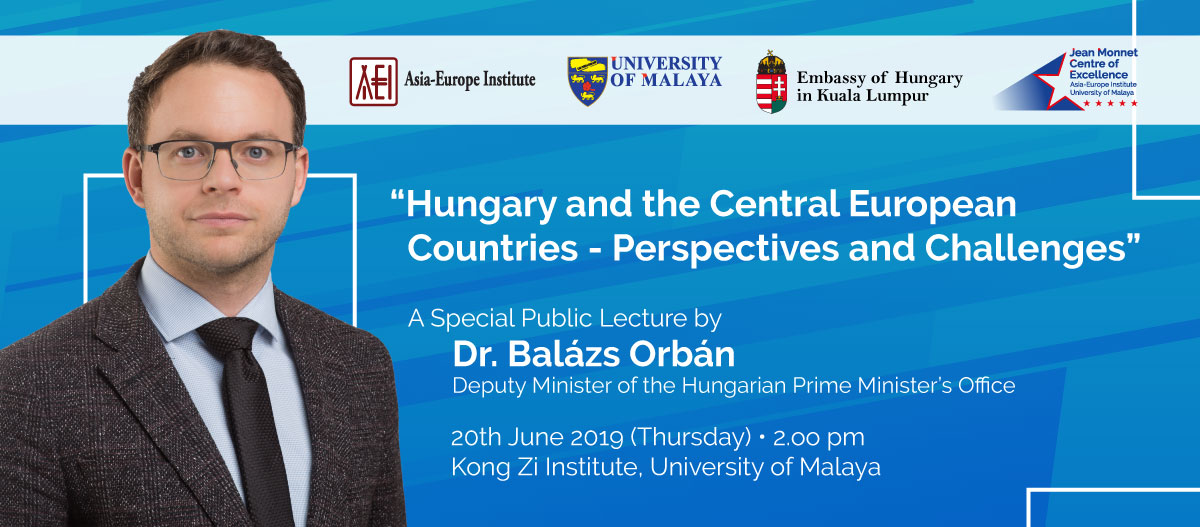
Rapporteur’s Report
Hungary and the Central European Countries: Perspectives and Challenges
Special Public Lecture
by
Dr. Balázs Orbán
Deputy Minister of the Hungarian Prime Minister’s Office
June 20, 2019
 As a part of its JMCoE distinguished lecture series, the Asia-Europe Institute hosted a special public lecture by Dr Balázs Orbán on June 20, 2019. The programme was organised by the institute in collaboration with the Embassy of Hungary in Kuala Lumpur and with the support of the Erasmus+ Programme of the European Union.
As a part of its JMCoE distinguished lecture series, the Asia-Europe Institute hosted a special public lecture by Dr Balázs Orbán on June 20, 2019. The programme was organised by the institute in collaboration with the Embassy of Hungary in Kuala Lumpur and with the support of the Erasmus+ Programme of the European Union.
The session was chaired and moderated by Dr Rahul Mishra, Senior Lecturer and coordinator, European Studies Programme at the Asia-Europe Institute. In his remarks Dr Mishra highlighted that both the Association of Southeast Asian Nations (ASEAN) and the European Union (EU) have evolved over the years and are interacting at different levels to boost inter-regional cooperation. Their interactions also exemplify how the major and middle powers in both these regional groupings interact with smaller powers, what is the dynamics, and what lessons can Malaysia and ASEAN learn from the EU.
Dr Mishra highlighted the fact that the year 2019 marked 50 years of the establishment of diplomatic ties between Hungary and Malaysia. He further stated that like Malaysia, Hungary too is a middle power, especially in the context of Central European region context.
The rapid changes in the global politics and ongoing transitions on both regional and sub-regional levels in Asia and Europe indicate that both Malaysia and Hungary are in a similar situation in their respective regions.
Both countries have to deal with issues such as: how to deal with the power rivalry between the US and China; how to deal with crisis migration, refugee issues, environment challenges, whether ASEAN and the EU are moving in the right direction as well as issues related to their positioning in their respective regions.
Lecture by Dr Balázs Orbán
Deputy Minister Balázs Orbán began by throwing light on how history has shaped Hungary’s political, economic, and external dynamics. He illustrated that Hungary has never been a colonial power, so it has had a limited role in shaping the world history. The Central European country was mostly focused on the Carpathian basin- a territory surrounded by mountains, and a home of the Hungarian nation since thousands of years. While Hungary did not colonise any foreign territory, it had been subjected to occupations by the Ottomans, the Mongols, the Russians, the Austrians, and the Germans. This has shaped the idea of sovereignty and led Hungarians respect the principle of independence and freedom.
He iterated that three factors have primarily shaped the way of life and governance in Hungary: long history of practising Christianity; the end of communism in Hungary in 1989, and transition to democracy; and the need to devise a solution based on the problems unique to Hungary. The end of communism in Hungary allowed Hungary to join the EU and the NATO. The idea was to learn from the experiences of other developed European countries.
He further highlighted the achievements of the conservative government in Hungary. The conservative government led by Victor Orbán, who had a majority of two-third in 2010, introduced economic reforms, and the Hungarian model became successful. The Hungarian Model is based on four pillars:
He further added that that from the period of 2010-14, the Orbán government brought about a systemic change and introduced constitutional reforms. He highlighted on important geopolitical developments such as the Brexit, and the leadership role Germany might play in Europe post-Brexit, US-China trade war, and the implications of those developments for Hungary.
He pointed out that the relations between Hungary and the US under the former President Donald Trump’s government saw an upward trajectory. With respect to China, he highlighted the importance of Central Europe in China-led Belt and Road Initiative (BRI). Hungary is a geographically important partner for China’s BRI, and there are joint infrastructural projects. One such project is the high-speed train between Belgrade and Budapest. He concluded by emphasising on the importance of economic cooperation between China and European countries.
After a brief Questions and Answer session, Dr Mishra concluded by highlighting how distinct Hungary is in comparison to majority of the mainstream of EU countries, and how it positions itself today and how the current government’s policy moves are likely to shape the Hungarian domestic politics and the foreign policy vis-à-vis European Union and the international community at large.
The session ended with a vote of thanks listing the presence of distinguished guests from the Embassy of Hungary and other representative of the diplomatic corps based in Kuala Lumpur.
Last Update: 27/12/2021